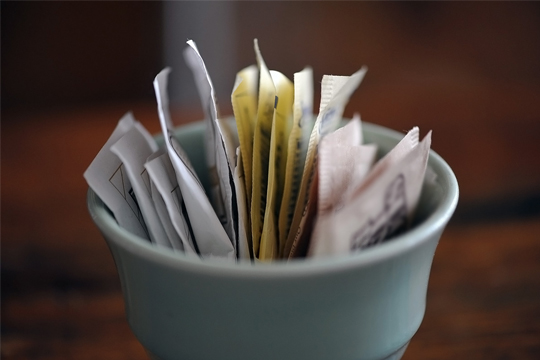
Reducing Food Waste in Foodservice
October 16, 2018 by Doreen Garelick, Dietetic Intern
Our intern Doreen attended a food waste summit for restaurants and compiled these tips to help food service operators redirect…
Nutrition 101
December 5, 2012

Photo: subsetsum
Culinary Nutritionist Andrea Canada weighs in on the rise in popularity of monk fruit as a sweetening agent.
At the Food and Nutrition Conference and Expo back in October, I came across the new darling of the sweetener world, the monk fruit. Grown on vines in the mountains in Asia, monk fruit is an especially sweet fruit that has been used for centuries for its sweetness. According to monkfruit.org, some of the sweetness of the monk fruit comes from a specific antioxidant compound in the fruit and not actually the sugars themselves.
In the 1990s, Procter & Gamble patented a process to extract the specific compound that contributes to the sweetness of the monk fruit. In this way, the sweetness of the fruit was concentrated into an ultra-sweet extract (200x the sweetness of cane sugar) that had no significant calories. Despite the patent being filed so long ago, it’s only recently that monk fruit has come to the fore.
Monk fruit extract is available as Pure Fruit and is also being used in a variety of non-caloric sweeteners such as Nectresse and Monk Fruit in the Raw. All can be used in beverages, smoothies, yogurts and oatmeal, among others. Like its competitors, Nectresse markets its proprietary blend of monk fruit extract, erythritol (a sugar alcohol), sugar and molasses as an all-natural no-calorie sweetener for use in coffee, tea, smoothies, oatmeal and yogurt. However, the process to extract the sweet element from the monk fruit seems over-simplified and as it requires a patent, is likely far from something that can be conducted outside a laboratory. For a sweetener that’s billed as “all-natural”, the process of extracting it might not be as natural as we’d like it to be.
Monk fruit extract is on the GRAS list, or "Generally Recognized As Safe" by the FDA. If you use non-nutritive sweeteners, you may like the taste of monk fruit in your beverages or yogurt. However, I’ve discussed the issues I have with sweetened beverages before. Typically, I prefer to sweeten my yogurt with fresh fruit and flavor plain seltzer with lemon juice.
Have you ever tried using monk fruit as a sweetener? Let us know in the comments below.

October 16, 2018 by Doreen Garelick, Dietetic Intern
Our intern Doreen attended a food waste summit for restaurants and compiled these tips to help food service operators redirect food waste from landfills.
Nutrition 101

Nutrition 101
September 26, 2018 by Doreen Garelick, Dietetic Intern
Ever notice headlines about rapid weightloss? Dietetic Intern Doreen Garelick looks deeper into a recent eye-catching headline to see if there's any truth behind it.
Connect
 Follow us on Twitter
Follow us on Twitter Friend us on Facebook
Friend us on Facebook Follow us on Pinterest
Follow us on Pinterest Follow us on Instagram
Follow us on Instagram Read our Blog
Read our Blog Watch videos on YouTube
Watch videos on YouTube Watch videos on Vimeo
Watch videos on Vimeo Connect with us on Linkedin
Connect with us on Linkedin Find us on Foursquare
Find us on Foursquare
Tweets by @SPEcertifiedBlog Search
Categories
SPE Certified Newsletter
Sign up for news on the latest SPE-certified venues, events and SPE updates.
We will never share your personal information with a third party.